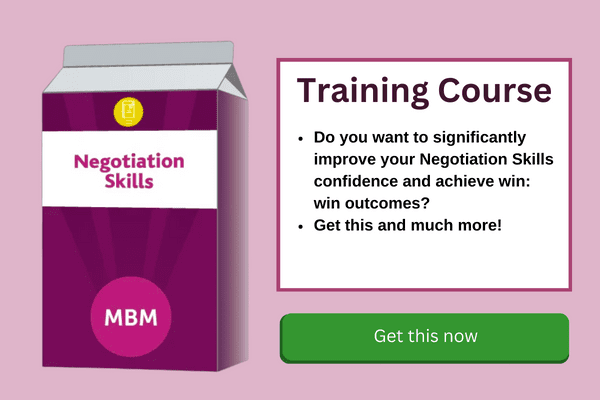Text negotiations are here to stay. They have become part of our ways of working and they do have their advantages and disadvantages.
We just need to know how to do them effectively so that we win more than we lose. These are the 3 most popular questions you ask about text negotiations followed by the benefits, downsides, and pitfalls.
Your 3 Most Popular Questions
1. What is Text Negotiation?
A negotiated text is where two people negotiate using words, Typically the text is referred to as SMS, though it could be the text used by Whatsapp or any other platform including Snapchat, Facebook, Teams, etc.
2. Should I Negotiate Over Text?
Many experts will say a resounding ‘No’ because effective negotiators can achieve more by reading the body language and the tone. Yet, to completely avoid negotiating over text can be a disadvantage because the other party may only negotiate over text, and also there can be advantages of a text negotiation.
Plus, a negotiation can be part face-to-face, part email, and part text too, so managing the negotiation across multiple platforms might be needed. Remember, that part of your negotiation might be to agree the platform for negotiation, as you will choose fewer platforms and the platform where you do your best work.
Sticky Learning ® is 7 times more effective than 1-day training courses. Plus, you will get a Chain of Evidence proving your Return on Investment. Discover soft skills training that changes behaviours long term.

3. What are Negotiating Skills?
Firstly, haggling is not negotiating. Know the difference. Secondly, there are 8 ways to resolve a conflict and haggling is a valid form, as is negotiating. Negotiating is about resolving a conflict by reaching an agreement, which is ideally win: win, though not always.

The Benefits of Text Negotiations
The main benefit of text negotiations is that it is instant. You can exchange messages with someone anywhere quickly. This enables you to achieve speed, potentially getting to an agreement much quicker than having to travel to meet them, meet, and then agree on an outcome.

The additional benefit depends on you. If you are what can be known as a ‘keyboard warrior’ who is brave behind a keyboard because they cannot be face-to-face or over the phone, then you have an advantage. But remember this, they do too. And also, it is not always an advantage to be passive-aggressive as this can come across as uncooperative because the other person is having to guess at what you really mean, which leads to ambiguity, confusion and tension.
Taking your time is the key benefit. If in face-to-face negotiations you struggle to think quick enough, then texting is an advantage for you because you can take your time to reply, and re-read your message before sending it. An opportunity which is not afforded when you have to verbally reply in a meeting – in text negotiations you have the opportunity to think through your message before sending.
The Pitfall of Text Negotiations
You cannot see them or hear them. Albert Mehrabian’s principle of communication was the 7-38-55 rule, which meant words, tone of voice, and body language respectively account for 7%, 38%, and 55% of personal communication. This is widely misunderstood because how can words only account for 7%, but what he actually meant was about congruency.
We look for communication from the words, to the ton, to the body language to ‘line-up’, and if they don’t, we can spot it a mile off. With text negotiations, we are limited to reading the 7%, with no clues coming from the other two major parts. This means that we can interpret what the other person is saying wrongly. They can also misinterpret what we are saying. Again, causing ambiguity, confusion and tension.
This is the pitfall of text negotiations because we can find ourselves negotiating, which is a conflict situation, which means that we are feeling under pressure to perform. And all whilst we are probably badly interpreting their demands and second-guessing what they really are saying or wanting.
Beyond the Pitfall
The pitfall of this form of negotiation means that you are both likely to fall into the pitfall of text negotiations, which is spending most of your time trying to differentiate whether they are negotiating a position that they want, or you are just trying to understand that this is what they want.
Beyond the pitfall of ambiguity that can ensue and that the other person can communicate much more bravely on text than they ever would face-to-face, is that the text negotiation may take ‘forever’. Whilst text is instant, it also has the ability to be long-running. This is because we type at about 35 words per minute and speak at about 150 words per minute. So, it is 4 times slower, which means that we communicate with fewer words, which, again can cause ambiguity, or we try to communicate with as many words as we would say when we speak, can’t, and become frustrated.
Plus, as we are typing the other person might not wait because they are keen to get their point across, unlike a conversation where we tend to wait for the other person to finish, and then the discussion because out of sync, and it becomes all about who can text the quickest. Age then becomes a differentiator as the younger person will text quicker than the older person. Text speed defeats the object of the negotiation – to resolve a conflict – and quickly the negotiation descends into frustration, anger, and stalemate.
How to Have a Text Negotiation and Win

- Choose the pace. Just because your opponent replies quickly does not mean you have to. Don’t be sucked into ‘he who types quickest wins’. They don’t.
- Re-read what you have written, before you send because the predictive text could lose you your negotiation.
- Enrich your messages to provide the clarity you want by adding emoticons, appropriately, and/or images.
- Don’t be worried when your opponent has read your message and not replied. They might just be in a meeting.
- Over-communicate. You know what you mean, but explain what you mean. Yes, it takes a few more words and you want to reply quickly but be clear and ask yourself ‘How might they interpret that another way?’.
- The normal principles of negotiating still apply; the 4 stages, if you then I, preparation, conditioning, and using 50 tools. All of which can be read in the negotiation skills category of our blog.
- Sometimes the first negotiation is to get a face-to-face meeting. Negotiating this over text begins with, ‘Let’s meet because I think I can save you a whole bunch of time’.
Further Reading
You can also read Noam Ebner’s research paper called ‘Negotiation via Text Messaging’ or take a negotiation skills self-assessment. For even more useful content on negotiations, check out our ultimate guide on negotiation skills.




